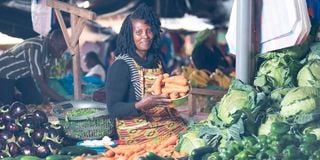Drive to strengthen traditional fresh food markets launched

Olivia Kaluki at her vegetables stall in Marikiti Market, Machakos County.
What you need to know:
- Global Alliance for Improved Nutrition was launched in 2002 to tackle malnutrition.
- GAIN works with both governments and businesses to transform food systems.
The growing human population is pushing up food demand even as agricultural land shrinks, necessitating improved food infrastructure; from production to marketing.
Most parts of the country still depend on traditional fresh food markets whose conditions remain deplorable, raising concerns about health and hygiene. Markets are where farmers, vendors and consumers converge, fostering connections essential for the resilience of food systems.
Further, despite the great potential traditional fresh food markets have, vendors remain vulnerable to shocks and struggle to access finance as well as social safety nets.
This, coupled with land and facility ownership challenges, and inefficiencies in market governance, has further compounded the challenges.
The Global Alliance for Improved Nutrition (GAIN), a Swiss-based foundation launched in 2002 to tackle human suffering caused by malnutrition, has been at the forefront in renovating markets in various parts of the country. From April 23 to 25, , the non-profit convened a conference to discuss improvements to market systems in the country.
Themed “Resilient Markets and Food Systems Governance”, it brought together diverse stakeholders, including government bodies, market committees and donors such as UN-Habitat, Syngenta Foundation for Sustainable Agriculture, and Food and Agriculture Organization.
GAIN works with both governments and businesses to transform food systems to deliver more nutritious food for all. It runs the Keeping Food Markets Working (KFMW), established when Covid-19 struck.
“The KFMW programme focused on mitigating Coronavirus disease risks on food systems and keeping affordable nutritious foods flowing in the markets,” said GAIN Kenya Country Director Ruth Okowa.
Interventions included infrastructure works such as renovations and fixing of roofs in the target markets, improving drainage systems and sanitation, and installation of hand-washing facilities.
“As GAIN, we believe that markets are not merely physical spaces where goods are exchanged; they are the mainstay of our urban environments, serving as hubs for economic activity, cultural exchange and social cohesion,” said Ms Okowa.

Kiluu Musilu at her vegetables stall in Marikiti Market, Machakos County.
The Resilient Markets and Food Systems Governance Conference explored actions to strengthen traditional food markets and enabling Kenyan food systems to withstand periodic challenges.
It is estimated that more than 70 per cent of Sub-Saharan African households, especially those most vulnerable to social, economic and environmental shocks, pervasive food insecurity and malnutrition access food from traditional markets.
In Kenya, the facilities remain a dominant source of both staples and nutrient-dense foods.
Speaking during the conference, Agriculture Principal Secretary Kipronoh Ronoh regretted that while many traditional food markets remain a primary source of both staples and nutrient-dense food for a large share of Kenya’s population, they are set up in a way that makes them structurally and operationally vulnerable to disruptions such as weather hazards, fires and power failures.
“They are essential to the food and nutrition security of urban and rural residents, but the majority are in deplorable conditions,” Dr Ronoh stated.
He added that the government is keen on working with key and strategic partners like GAIN to transform food systems
“We must not overlook the imperative of gender responsiveness and inclusivity within our endeavours. Traditional food markets are strongholds of livelihoods for many women, therefore, we are obligated to ensure equitable access to resources and opportunities, thus empowering women to assume meaningful roles in market governance,” he explained.
Rapid population growth coupled with climate change is negatively affecting agricultural productivity and food production, impacting food systems, rural livelihoods, and nutrition outcomes. Therefore, traditional food markets play a major role in post-harvest loss management.
The Resilient Markets Programme is currently being implemented in one market in each of the five implementation counties—Marikiti in Machakos, Madaraka in Kiambu, Free Area in Nakuru, Soweto in Nairobi, and Kongowea in Mombasa.
The project goal is to enhance the resilience of traditional fresh food markets through effective inclusion, empowerment, and mobilization of key food systems actors.





